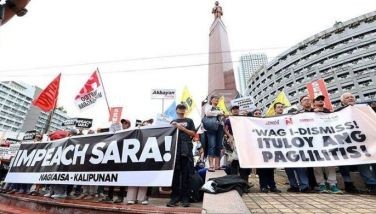Consultation and participation in development
In recent years, our vocabulary has been enriched by a few significant, albeit, oftentimes misplaced, terms in development. These include such words as decentralization, autonomy, participation, consultation, and empowerment. Usually, for any given move, mostly by government and in the form of policy, goal, objective, program, or project, someone will oppose and say, “We were not consulted.” This has become a byword in the daily news report. Difficult it maybe to admit, it does slow down development processes, for certainly reasonable and noble reasons.
But we should ask ourselves, should it be a cause of delay or setback? I have come across too many such disagreements to conclude that much of these are caused simply by a lack of a common understanding of what these words really mean. Let me zero in on one – “consultation” and by association, “participation,” or more precisely, “public participation.” When we collectively agree that people need to be consulted in all aspects of governance and development, what does that entail? What are the procedures necessary and to what extent do we consult? What are the guidelines?
The need for consultation is deeply rooted in our democratic system, which defines a government “of the people, by the people, and for the people.” But it is painted against a backdrop of a reality that people are different, and will always have different needs and views. Democracy further dictates that all decisions should be “of the majority while respecting the minority.” But it presupposes that all concerned are adequately well-informed to make their individual sound judgment. This adds another term - “transparency.” Presently, this is epitomized by the cry for “freedom of information.” Thus, in the development process, people should be informed and consulted, and are allowed to participate.
The question is how. In proposing for a project for a city of one million, do we have to consult all of the one million residents individually? If we can, why not, though we know this is not possible. We can also opine that we live in a “representative” form of government - the governor/mayor represents the people so only he/she may be consulted. My friends in the civil society will balk at this thought, and for good reasons. That’s why we also have the provincial boards/city councils – they, too, represent the people. But to many, that is not enough. We have to consult all the “sectors” affected, or the other “stakeholders.” But even that has problems because the sectors/stakeholders might not even be united. Others demand “public hearings” but you wonder if the people who attend those really represent the majority. And regardless of how we craft public consultation measures, there will always be someone who will be absent, for whatever reasons, who will say later, “I was not consulted.”
The argument will be endless unless we set a common ground on what constitutes consultation. Whether people agree or not, the guidelines have to be set by law, and is actually already enshrined in the Constitution, the Local Government Code (LGC), and other laws. Government is the primary driver of development projects and it has to adhere to existing laws to move, including such requirements for consultation. This is where the “development council” framework in the LGC sets in. The LGC states that the local development councils shall “appraise and prioritize socioeconomic development programs and projects.” It further provides that barangay development councils shall “mobilize people’s participation in local development efforts.”
It’s all there, what else do we need? Maybe the question really is, are local government units, and the concerned sectors of society abiding with those provisions of law … It may be flawed, but without it, all we have are the incessant debates about the lack of consultation – of government officials who do not want others to participate, or, of sectors who do not make use of the avenues specifically provided to them for such consultation.
* * *
Email: streetlife@villarete.com
- Latest
- Trending


























